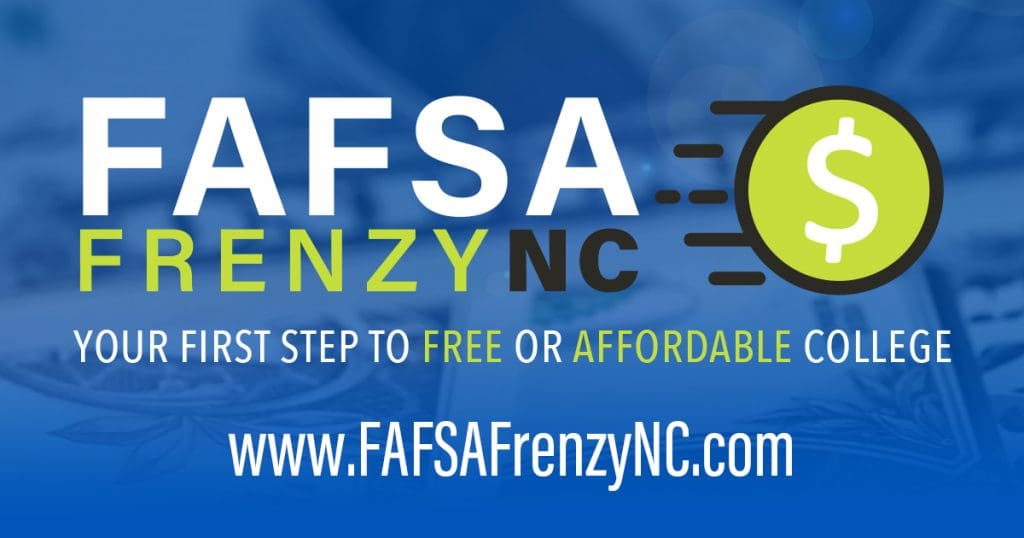
According to a 2020 report by Education Strategy Group, students who complete the Free Application for Federal Student Aid (FAFSA) are far more likely to enroll in higher education. In fact, 90% of FAFSA completers attend college directly after high school, compared to just 55% of students who don’t complete the FAFSA. FAFSA completers are also more likely to persist in their coursework and obtain a degree.
Those are eye-opening statistics, especially in a state whose economic and cultural vitality is so firmly tied to its investment in higher education. The FAFSA is a crucial first step toward free or affordable college. That’s why myFutureNC and dozens of key partners are launching a month-long FAFSA Frenzy NC campaign that will run throughout June.
Partners Across NC’s Higher Ed Landscape
myFutureNC is a consortium of North Carolina’s leaders in education, business, and government, dedicated to closing the educational attainment gap in North Carolina. The organization’s critical attainment goal has garnered bipartisan support: by 2030, North Carolina needs to have 2 million residents with a high-quality postsecondary degree or credential.
But only half of the state’s high school seniors have completed the FAFSA form to date this year. That’s a decline of three percent, and it’s cause for concern for North Carolina leaders. The FAFSA Frenzy campaign is designed to generate the momentum needed to reverse that trend. The campaign’s goal is to motivate more students to complete their FAFSA and to recognize that a life-changing postsecondary credential is within reach.
Crucially, North Carolina’s attainment goal does not narrowly focus on four-year degrees and neither does the FAFSA. myFutureNC’s partners want North Carolinians to pursue any educational option that will pave the way for professional success and a rewarding life, whether that’s a professional credential, an associate, or a bachelor’s degree. That’s why the UNC System, North Carolina Community Colleges, North Carolina Independent Colleges and Universities, North Carolina Department of Public Instruction, and College Foundation of North Carolina have all partnered to spread the message.
Making FAFSA Easy
The FAFSA Frenzy campaign includes a newly launched website (FAFSAFrenzyNC.com), which explains the ins and outs of filing the FAFSA and directs users to free, hands-on financial aid counselling. The campaign will also feature an intensive social media component. A variety of high school, higher education, and community partners will use social media channels to issue messages of encouragement and helpful reminders to students and their families.
“We know the jobs of the future, and just as importantly, the jobs of today, require education after high school,” said Cecilia Holden, of myFutureNC. “We also know completing the FAFSA is directly linked to college enrollment and attendance. It’s more important now than ever, with the high unemployment and economic uncertainty from the COVID-19 crisis, that our high school seniors earn a college degree or high-quality credential to prepare them for the workforce. Now is not the time to wait or to take a gap year.”
While only about half of North Carolinians ages 25-44 have a high-quality credential or postsecondary degree, students from low income households are even less likely to get the education they need to earn a living wage. The percentage of Black, Hispanic, and Native American residents with a postsecondary degree consistently falls below the state average.
Meanwhile, North Carolina students who did not submit a FAFSA in 2019 left an estimated $89 million in Pell Grants funds unused. EdNC has created a map that shows the status of each county’s FAFSA completion rate here.

The 2020 North Carolina Superintendent of the Year, Dr. Anthony D. Jackson, sees firsthand the life-changing difference the FAFSA can make for underserved students.
“Many of our lower income students don’t realize that they are leaving money on the table and they could qualify for free or affordable college,” said Dr. Jackson, superintendent of Vance County Schools. “One of the best ways to close the gap and get our college going rate up is to encourage all North Carolina students and their families to complete the FAFSA. That’s why I am joining this campaign, and encouraging all schools, school systems, colleges and universities to participate.”
Expanding Access to Transformative Opportunities
The UNC System is a partner in myFutureNC, and University leaders at every level will be participating in the FAFSA Frenzy campaign. The effort reflects the UNC System’s commitment to expanding the pathways that lead students from all 100 North Carolina counties to higher education opportunities.
“Creating access to higher education is one of the five key pillars of the UNC System’s Strategic Plan. Keeping tuition costs low is only part of the equation. Students also need to understand the resources that can help them finance their education,” explained UNC System Senior Vice President for Strategy and Policy Andrew Kelly. “The FAFSA Frenzy campaign presents a unique opportunity to show qualified high school seniors in every corner of the state that there is support out there for their college ambitions.”
A university degree brings economic mobility and social value. By participating in the FAFSA Frenzy campaign, the UNC System is inspiring prospective students from many different backgrounds and experiences to see higher education as an attainable and life-changing opportunity.